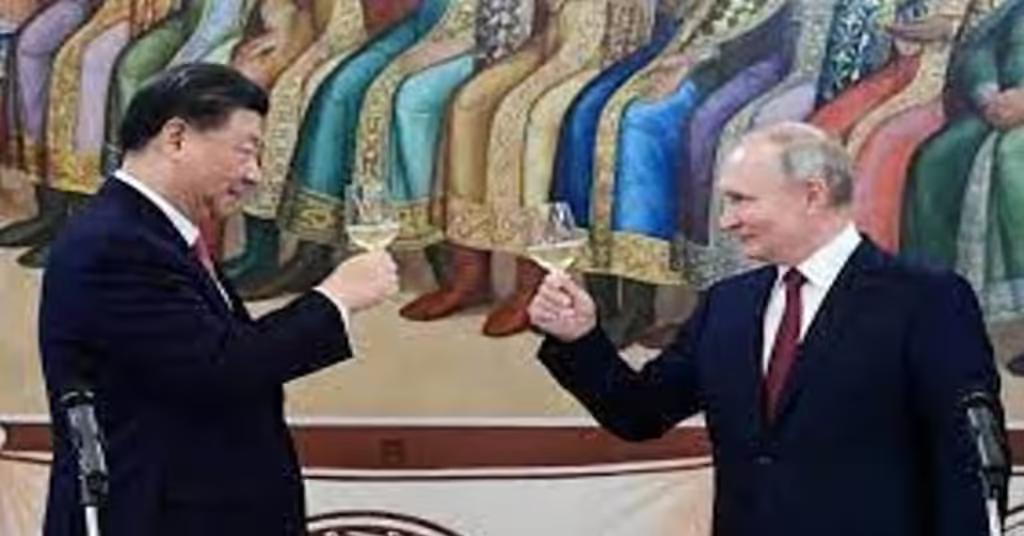
Here’s what Wagner uprising could mean for Russia’s ties with China- Just three months prior, Xi Jinping, the head of China, was in Moscow shaking hands with Vladimir Putin and gushing about the “firm support” the Russian president had among his people.
This assurance is now in doubt after the Wagner private military force launched an uprising in Russia, shattering Putin’s perception of his invulnerability. Chinese observers think that despite how brief it was, the rebellion may have encouraged Xi to temper Beijing’s close ties to Russia, which had drawn criticism from around the world and threatened some of its foreign interests.
China sees Russia as a crucial ally in its opposition to the US-dominated international system.
Only if Putin stays in power to support the mutual interests of both countries will Xi’s long-term wager succeed. However, the uprising has cast doubt on Putin’s authority as regular Russian forces offered little to no resistance to the Wagner soldiers’ assault on Moscow. Putin’s choice to give Yevgeny Prigozhin, the uprising’s leader, asylum in Belarus also smacked more of a compromise than of a strongman acting in his own interests.
“It makes China realise that the Putin government’s internal politics are actually quite fragile,” said Xiao Bin. A scholar at the Chinese Academy of Social Sciences’ Institute of Russian, East European, and Central Asian Studies. Although it was already fragile, it has grown more so since the Russia-Ukraine war started.
Following the uprising, China openly reiterated its support for the Kremlin, and observers say the connection is likely to continue strong, at least on the outside. Because of how the interests of the two presidents coincide.
However, the rebellion has certainly also made Beijing think about how the fall of Putin will affect its own geopolitical, economic, and territorial objectives. That might cause China to somewhat sever ties with Russia.
In the 23 years that President Putin has been in office, relations between Russia and China have significantly improved from the Soviet era and the time of President Boris Yeltsin, when the two countries deployed dozens of military divisions to engage in combat along their 2,600-mile shared border.
Any current Russian regime transition would result in an immediate reckoning for the alliance. According to Xiao, China would be afraid that a new Russian leader might realign the country towards a more amicable stance towards the United States. That might isolate China in its conflict with the United States and make it more vulnerable to coercion.
More seriously, according to John Culver, a former U.S. intelligence specialist on China, deteriorating ties between Beijing and Moscow may force China to relocate soldiers to its border with Russia once more at the expense of other locations.
China has been able to prepare for the increased possibility of conflict over Taiwan, the South China Sea, or with India by reducing the amount of troops stationed along the border, according to Culver. “I don’t believe enough has occurred to make them rethink that. But for the first time they have cause to wonder if perhaps they must,” the author said.
Any unrest in Russia would serve as a reminder to China of the importance of safeguarding its access to Russian energy imports.
At the same time, Wen-Ti Sung, a political scientist at Australian National University. Suggested that a weaker Putin would present a chance for China to advance.
Beijing should think about stepping up its attempts to pressure Russia into making further concessions. Access to additional Russian technology and better conditions for the Power of Siberia 2 gas pipeline, which would help divert Russian gas supplies that previously went to Europe towards China instead, might be at the top of China’s list of priorities.
The uncertainties surrounding Putin’s political future serve to emphasise how differently he and Xi have addressed their shared objectives of undermining American global dominance and reforming the international system to serve their own countries’ interests better.
The biggest war in Europe since World War II has been started by Putin, who has been much more aggressive. Xi has undoubtedly adopted a more aggressive territorial posture in recent years, especially with Taiwan. The self-governing island democracy that Beijing claims, employing economic penalties and military exercises to maintain tension on the island. However, he has shown caution thus far in order to prevent the standoff from escalating into a war that would involve the United States and its allies.
Xi has also been concentrating on gaining control of her own country. The Chinese leader started a significant reorganisation of the People’s Liberation Army in 2015 to tighten his control over the military by removing leaders who were seen as corrupt or disloyal and boosting his friends, in many ways to avoid the concerns.
Some see the Wagner uprising as the most recent indication that China’s relations with Russia are becoming more comparable to those with North Korea. A nation that is famously unreliable and that takes use of its erratic behaviour to pressure China for more help in exchange for buckling under pressure.
Russia’s trade with China has increased to historic levels since its invasion of Ukraine. Beijing has also taken steps to prevent Moscow from losing diplomatic support.
According to Sung
According to Sung, Russia’s major motivation is to increase the cost of its relationship in order to benefit more from its interactions with China. When it appears careless and unpredictable, like North Korea, Russia is capable of doing this.
